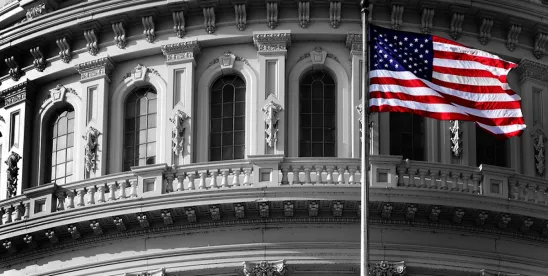On September 9, 2024, the U.S. House of Representatives commenced “China Week,” during which the House passed 25 bills intended to limit the influence of the Chinese Communist Party in the United States.[1] Among these was the BIOSECURE Act—a piece of legislation that would prohibit federal funding for equipment or services provided by a “biotechnology company of concern.”[2] The House voted in favor of the bill by a vote of 306 to 81 on Monday, and it will now move to the Senate.[3]
A brief history of the BIOSECURE Act, a summary of its provisions, and an analysis of its supply chain implications are described below.
Legislative History:
The BIOSECURE Act is a bipartisan bill and was first introduced in January 2024 by Reps. Raja Krishnamoorthi (D-Ill.) and Mike Gallagher (R-Wis.) as H.R. 7085.[4] Regarding its purpose, Rep. Krishnamoorthi stated: “It is unacceptable for U.S. taxpayer dollars to be used to subsidize biotech companies of our foreign adversaries. By allowing these companies to amass and analyze large amounts of foreign genomic data, we risk our most sensitive information being used by our foreign adversaries against us. Our legislation addresses this problem by establishing a regulatory framework to prevent the flow of taxpayer dollars to biotech entities of concern.”[5]
In May 2024, Rep. Brad Wenstrup (R-Ohio) introduced a substantially similar version of the bill as H.R. 8333.[6] The House Oversight Committee then ordered it be reported.[7] On July 8, 2024, House Speaker Mike Johnson (R-La.) committed to bringing the BIOSECURE Act to the floor for a vote following the congressional recess.[8]
On September 9, 2024, the House Committee on Oversight and Accountability Chairman James Comer (R-Ky.) delivered remarks on the House floor in support, stating that the Committee “has worked hard with outside stakeholders and other Committees of jurisdiction to ensure these national security risks are meaningfully addressed without disrupting medical and pharmaceutical supply chains.”[9] The House voted 306 to 81 in favor of the BIOSECURE Act.
The Provisions:
The BIOSECURE Act prohibits federal agencies from procuring or obtaining
“biotechnology equipment or services” from a “biotechnology company of concern,” or entering into a contract with an entity that uses such equipment or services. In addition, the BIOSECURE Act prohibits recipients of federal funds from using them to purchase biotechnology equipment or services from a biotechnology company of concern.
Definitions:
The definition of a “biotechnology company of concern” is an entity that satisfies the following criteria:
- The entity is subject to the administrative governance structure, direction, control, or operates on behalf of the government of a foreign adversary (which includes North Korea, China, Russia, and Iran);
- The entity is involved in the manufacturing, distribution, provision, or procurement of a biotechnology equipment or service; and
- The entity poses a risk to national security based on (i) “engaging in joint research with, being supported by, or being affiliated with a foreign adversary’s military, internal security forces, or intelligence agencies,” (ii) “providing multiomic data obtained via biotechnology equipment or services to the government of a foreign adversary,” or (iii) “obtaining human multiomic data via the biotechnology equipment or services without express and informed consent
There are five companies, however, that are expressly designated as biotechnology companies of concern with out regard to the above criteria. Specifically, BGI, MGI, Complete Genomics, WuXi AppTee, and WuXi Biologies.
As for the definitions of “biotechnology equipment” and “biotechnology services,” they are broadly defined. “Biotechnology equipment” includes any:
Instrument, apparatus, machine, or device, including components and accessories thereof, that is designed for use in the research, development, production, or analysis of biological materials as well as any software, firmware, or other digital components that are specifically designed for use in, and necessary for the operation of, such equipment.
“Biotechnology services” is similarly comprehensive and includes, “Any service for the research, development, production, analysis, detection, or provision of information, including data storage and transmission related to biological materials.”
The BIOSECURE Act clarifies, though, that “biotechnology equipment or services” does not include those “that were formerly, but are no longer, produced or provided by biotechnology companies of concern.”
Designating Biotechnology Companies Of Concern:
The BIOSECURE Act currently identifies five “biotechnology companies of concern” but contemplates a process by which additional entities will be included. The Secretary of Defense, in coordination with the Attorney General, the Secretary of Health and Human Services, the Secretary of Commerce, the Director of National Intelligence, the Secretary of Homeland Security, the Secretary of State, and the National Cyber Director, is required to provide a list of suggested entities to the Director of the Office of Management and Budget (“OMB”). Then, the Director of the OMB, within one year of the enactment of the BIOSECURE Act, must publish a list of biotechnology companies of concern. This list will be periodically reviewed and modified as appropriate.
An entity will not receive advance notice that it has been designated as a biotechnology company of concern. It will, however, have 90 days to submit information and argument in opposition to the designation.
Exceptions
The BIOSECURE Act does not apply to (1) authorized intelligence activities of the United States, and (2) health care services provided overseas for federal employees, armed services, and government contractors that are in a foreign country to perform under a contract that supports federal employees or armed services.
Waiver
The head of the applicable executive agency may waive the prohibitions of the BIOSECURE Act on a “case-by-case basis” with the approval of the Director of the OMB, in coordination with Secretary of Defense.
Supply Chain Implications:
Companies will need to carefully audit their supply chains, and should consider taking the following actions:
- Determine whether any aspects of their supply chains rely upon biotechnology equipment or services from BGI, MGI, Complete Genomics, WuXi AppTee, and WuXi Biologies, or any of their related companies. The BIOSECURE Act includes their subsidiaries, parents, affiliates, and successor entities, provided that they are also subject to control of foreign adversary governments.
- Determine whether any aspects of their supply chains rely on any other biotechnology companies located in North Korea, China, Russia, and/or Iran, and whether those entities are likely to be designated “biotechnology companies of concern.”
- Explore substitutes for the equipment or services provided by biotechnology companies that are at a risk of being designated “of concern” and barred from receiving federal funds, in order to minimize business disruptions.
- Evaluate the termination provisions in any contracts with biotechnology companies in their supply chains that are at risk of being designated “of concern.” The cost of early termination may outweigh the risk of abruptly losing a supply chain partner.
Many stakeholders, particularly in the pharmaceutical industry, raised concerns about supply chain disruptions as a result of the BIOSECURE Act.[10] As reported by the Biotechnology Innovation Organization, a survey of 124 biopharmaceutical and biotechnology companies showed that 79% have at least one contract or product with a China-based or China-owned development and/or manufacturing organization.[11] Addressing those concerns, the BIOSECURE Act provides for a period of time for companies to exit contracts with “biotechnology companies of concern,” so long as those contracts were entered before the effective date of BIOSECURE. If the contract is with one of the five named Chinese companies, the BIOSECURE Act allows seven years, otherwise it allows five years.
[1] China Week Recap: Congress Passes 25 Bills to Combat Chinese Communist Party Threats, Select Committee on the CCP (Sept. 12, 2024), https://selectcommitteeontheccp.house.gov/media/press-releases/china-week-recap-congress-passes-25-bills-combat-chinese-communist-party.
[2] Id.
[3] H.R.8333, https://www.congress.gov/bill/118th-congress/house-bill/8333/all-actions.
[4] Bipartisan Group of Select Committee Members Lead Coalition Introducing House and Senate Bills to Ban Foreign Adversary Biotech Companies, Including BGI Group, Select Committee on the CCP (Jan. 25, 2024), https://democrats-selectcommitteeontheccp.house.gov/media/press-releases/bipartisan-group-select-committee-members-lead-coalition-introducing-house-and
[5] Id.
[6] H.R.8333, https://www.congress.gov/bill/118th-congress/house-bill/8333/all-actions.
[7] Id.
[8] Moolenaar on Speaker Johnson’s Plan to Renew the Select Committee , Select Committee on the CCP (July 8, 2024), https://selectcommitteeontheccp.house.gov/media/press-releases/moolenaar-speaker-johnsons-plan-renew-select-committee.
[9] Comer Delivers Remarks in Support of Bipartisan BIOSECURE Act, Committee on Oversight and Accountability (Sept. 9 2024), https://oversight.house.gov/release/comer-delivers-remarks-in-support-of-bipartisan-biosecure-act/.
[10] The US Biosecure Act Threatens to Destablise The Pharmaceutical Industry, Pharmaceutical Technology (July 17, 2024), https://www.pharmaceutical-technology.com/analyst-comment/us-biosecure-act-destabilise-pharmaceutical-industry/?cf-view.
[11] Bio Survey Reveals Dependence on Chinese Biomanufacturing, Biotechnology Innovation Organization (May 9, 2024), https://www.bio.org/gooddaybio-archive/bio-survey-reveals-dependence-chinese-biomanufacturing.





 />i
/>i

